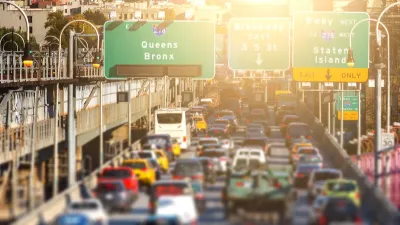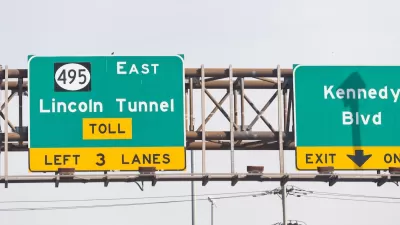Thinking about congestion as an economic problem generates new solutions for the problem as well as a response to accusations of social engineering.
A post on Urban Kchoze starts out by explaining traffic congestion using economic, rather than engineering, concepts. That discussion produces, however, a searing response to claims that transit investment, reduced parking requirements, and other progressive approaches to congestion are "social engineering."
First, the post describes some of the concepts of economics, like benefits and costs, which should be applied to the problem of congestion. Treating congestion as an economic problem allows new types of solutions, rather than the engineering approach of just creating more roadway capacity. Those solutions include "spatial and temporal redistribution of trips," "elimination of trips," and "favoring travel modes that are more space efficient."
The post also takes a moment to describe the resistance by two powerful players in the game of transportation planning to thinking about congestion on economic terms:
"One of the reasons why engineers don't like this vision, apart from the added complexity, is the "CHOOSE" part, and the availability of non-engineering policy solutions. Engineers are professionals taught to avoid partiality and who prefer to be neutral experts rather than militants for implementing given social policies, so considering non-engineering solutions makes them feel very ill at ease as they feel it exceeds their job mandate.
At the same time, politicians who don't have much vision may simply ask engineers to solve congestion issues, entrusting experts with solving their city's problems. This may create a situation where economic solutions are not considered as the experts asked to study the situation do not think they have been given the mandate to evaluate these policy solutions."
Then, helpfully to the political debates inspired by progressive transportation planning efforts, such as Mobility Plan 2035, recently approved (and sued) in Los Angeles:
"The idea of regulating or influencing individual behavior through policies based on economics often leads to accusations of social engineering. I just want to respond that neutrality in this case is essentially impossible. Streets and roads, by their very design, are public goods except for a few exceptions, as such, funding for them is determined by the public authority responsible for them. Therefore, that public authority is forced to make a choice, and the choice it makes will necessarily affect users' behavior and consumption of that good."
The article includes a closer examination of the implementation of several economics-based congestion strategies, including "letting congestion take care of it," a "congestion charge," "tolling high-speed roadways," "building low-cost, high-capacity, low-speed road networks," "limiting parking or increasing parking costs," and investing in rapid transit.
FULL STORY: Tackling congestion as an economic, not engineering, problem

Study: Maui’s Plan to Convert Vacation Rentals to Long-Term Housing Could Cause Nearly $1 Billion Economic Loss
The plan would reduce visitor accommodation by 25,% resulting in 1,900 jobs lost.

Alabama: Trump Terminates Settlements for Black Communities Harmed By Raw Sewage
Trump deemed the landmark civil rights agreement “illegal DEI and environmental justice policy.”

Why Should We Subsidize Public Transportation?
Many public transit agencies face financial stress due to rising costs, declining fare revenue, and declining subsidies. Transit advocates must provide a strong business case for increasing public transit funding.

Paris Bike Boom Leads to Steep Drop in Air Pollution
The French city’s air quality has improved dramatically in the past 20 years, coinciding with a growth in cycling.

Why Housing Costs More to Build in California Than in Texas
Hard costs like labor and materials combined with ‘soft’ costs such as permitting make building in the San Francisco Bay Area almost three times as costly as in Texas cities.

San Diego County Sees a Rise in Urban Coyotes
San Diego County experiences a rise in urban coyotes, as sightings become prevalent throughout its urban neighbourhoods and surrounding areas.
Urban Design for Planners 1: Software Tools
This six-course series explores essential urban design concepts using open source software and equips planners with the tools they need to participate fully in the urban design process.
Planning for Universal Design
Learn the tools for implementing Universal Design in planning regulations.
Smith Gee Studio
Alamo Area Metropolitan Planning Organization
City of Santa Clarita
Institute for Housing and Urban Development Studies (IHS)
City of Grandview
Harvard GSD Executive Education
Toledo-Lucas County Plan Commissions
Salt Lake City
NYU Wagner Graduate School of Public Service





























